Psychology for Health and Social Care: Theories and Applications
VerifiedAdded on 2020/02/14
|13
|4626
|285
Report
AI Summary
This report provides a comprehensive overview of psychological principles within the context of health and social care. It begins by exploring lifespan development theories, including stage, open-ended, continuity, and discontinuity theories, and how these relate to different life stages such as infancy, childhood, adolescence, and adulthood. The report then delves into specific psychological theories like Piaget's theory of cognitive development and Erikson's stages of psychosocial development, detailing their key features and implications for health and social care settings. Further, the report analyzes the influence of social and biological factors on human behavior, using a case study to illustrate how these factors interact. It also emphasizes the importance of social roles in health and social care, particularly in the context of individuals facing mental health challenges such as Alzheimer's disease. The report concludes by examining the application of psychological theories to understand behavior disturbances, mental disorders, and relationships within health and social care, offering insights into how these theories inform effective care practices.
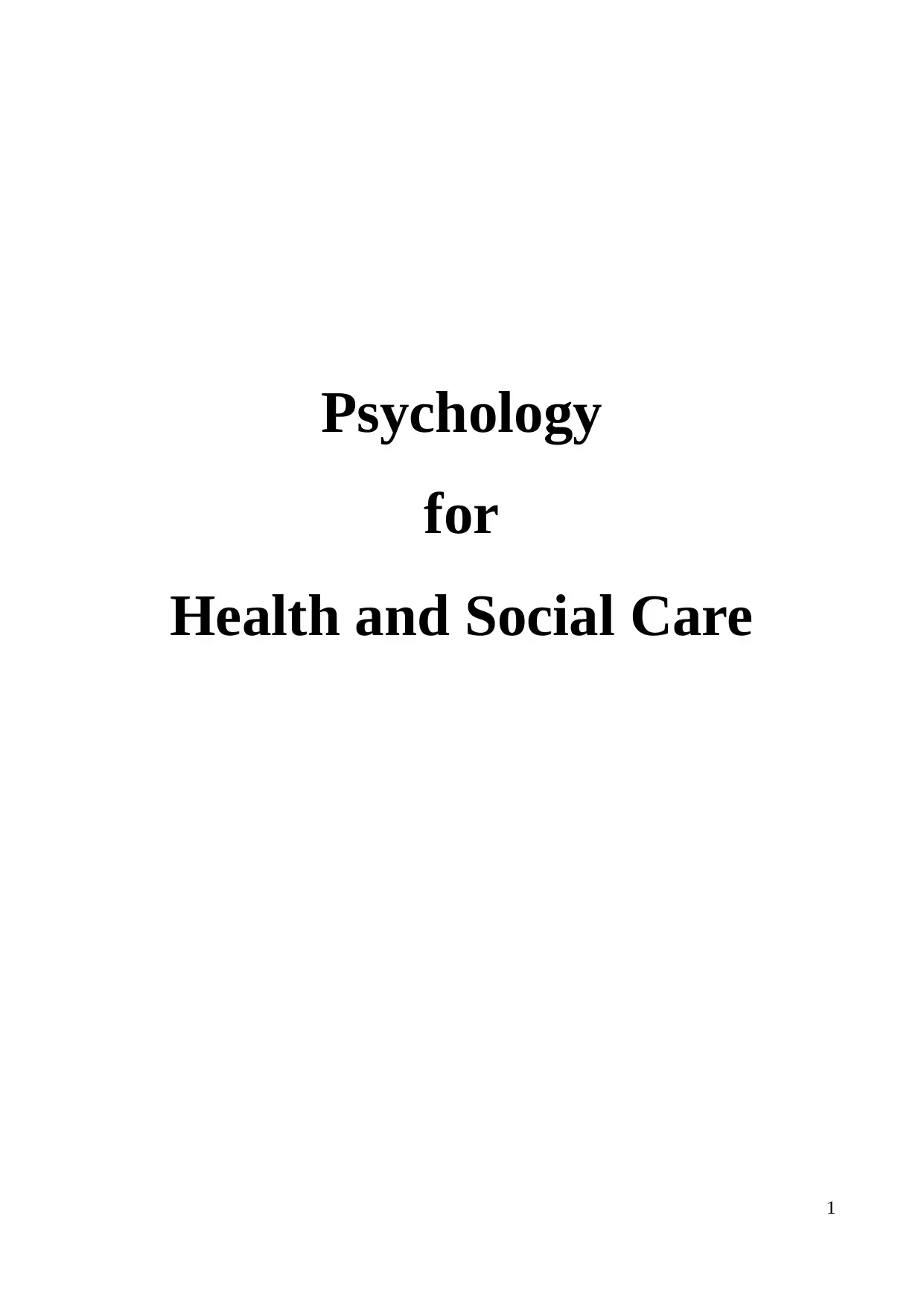
Psychology
for
Health and Social Care
1
for
Health and Social Care
1
Paraphrase This Document
Need a fresh take? Get an instant paraphrase of this document with our AI Paraphraser
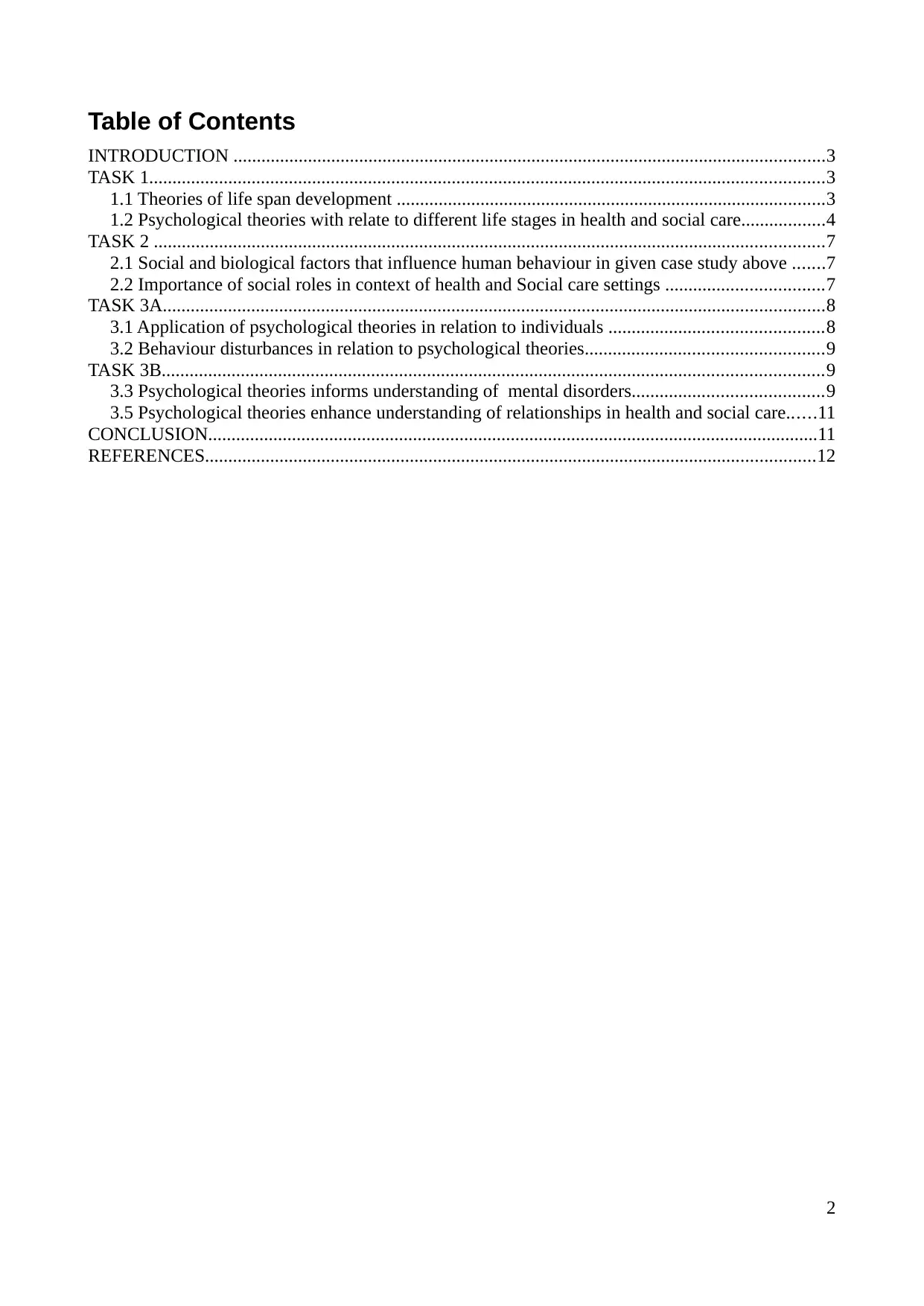
Table of Contents
INTRODUCTION ...............................................................................................................................3
TASK 1.................................................................................................................................................3
1.1 Theories of life span development ............................................................................................3
1.2 Psychological theories with relate to different life stages in health and social care..................4
TASK 2 ................................................................................................................................................7
2.1 Social and biological factors that influence human behaviour in given case study above .......7
2.2 Importance of social roles in context of health and Social care settings ..................................7
TASK 3A..............................................................................................................................................8
3.1 Application of psychological theories in relation to individuals ..............................................8
3.2 Behaviour disturbances in relation to psychological theories...................................................9
TASK 3B..............................................................................................................................................9
3.3 Psychological theories informs understanding of mental disorders.........................................9
3.5 Psychological theories enhance understanding of relationships in health and social care......11
CONCLUSION...................................................................................................................................11
REFERENCES...................................................................................................................................12
2
INTRODUCTION ...............................................................................................................................3
TASK 1.................................................................................................................................................3
1.1 Theories of life span development ............................................................................................3
1.2 Psychological theories with relate to different life stages in health and social care..................4
TASK 2 ................................................................................................................................................7
2.1 Social and biological factors that influence human behaviour in given case study above .......7
2.2 Importance of social roles in context of health and Social care settings ..................................7
TASK 3A..............................................................................................................................................8
3.1 Application of psychological theories in relation to individuals ..............................................8
3.2 Behaviour disturbances in relation to psychological theories...................................................9
TASK 3B..............................................................................................................................................9
3.3 Psychological theories informs understanding of mental disorders.........................................9
3.5 Psychological theories enhance understanding of relationships in health and social care......11
CONCLUSION...................................................................................................................................11
REFERENCES...................................................................................................................................12
2
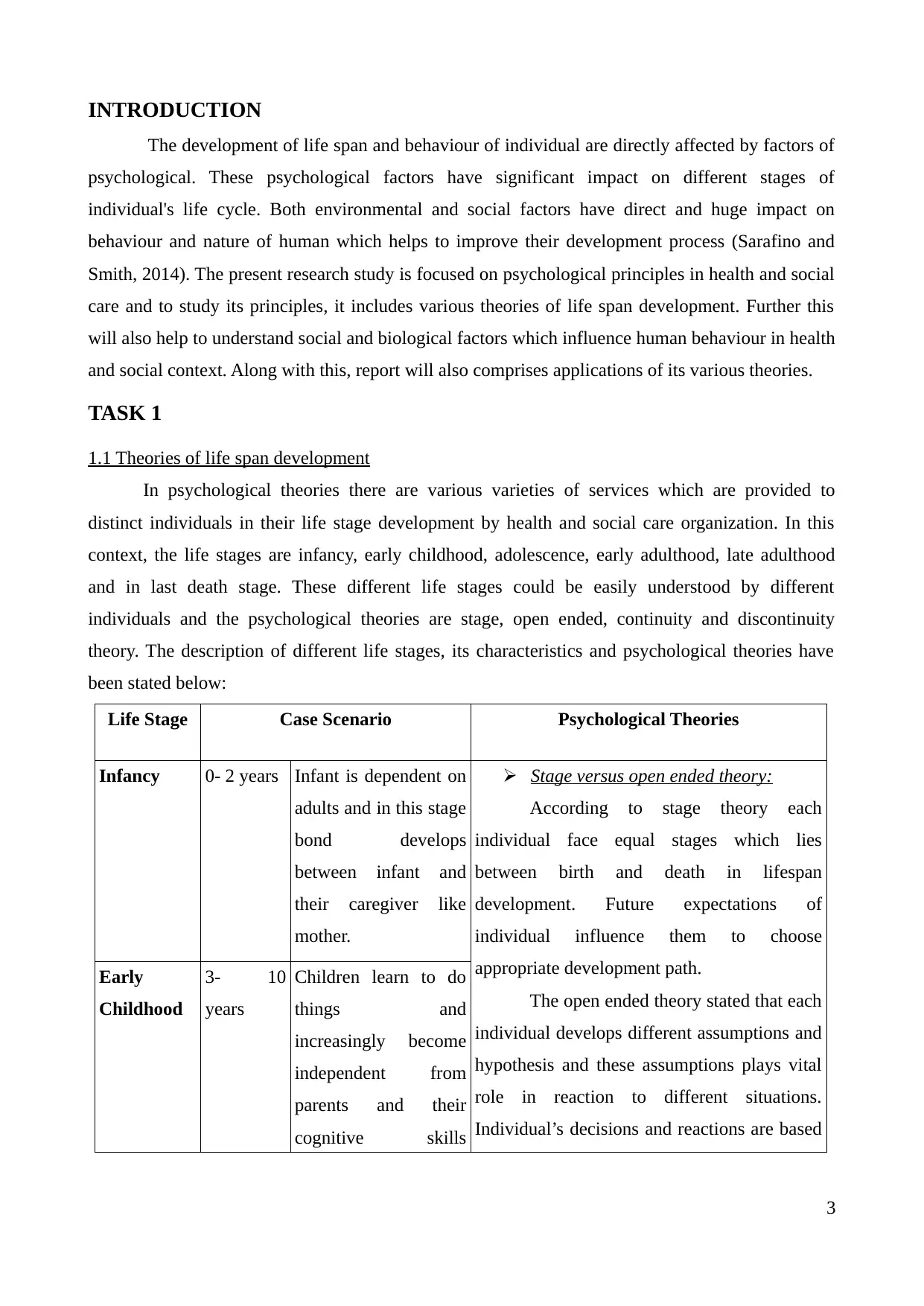
INTRODUCTION
The development of life span and behaviour of individual are directly affected by factors of
psychological. These psychological factors have significant impact on different stages of
individual's life cycle. Both environmental and social factors have direct and huge impact on
behaviour and nature of human which helps to improve their development process (Sarafino and
Smith, 2014). The present research study is focused on psychological principles in health and social
care and to study its principles, it includes various theories of life span development. Further this
will also help to understand social and biological factors which influence human behaviour in health
and social context. Along with this, report will also comprises applications of its various theories.
TASK 1
1.1 Theories of life span development
In psychological theories there are various varieties of services which are provided to
distinct individuals in their life stage development by health and social care organization. In this
context, the life stages are infancy, early childhood, adolescence, early adulthood, late adulthood
and in last death stage. These different life stages could be easily understood by different
individuals and the psychological theories are stage, open ended, continuity and discontinuity
theory. The description of different life stages, its characteristics and psychological theories have
been stated below:
Life Stage Case Scenario Psychological Theories
Infancy 0- 2 years Infant is dependent on
adults and in this stage
bond develops
between infant and
their caregiver like
mother.
Stage versus open ended theory:
According to stage theory each
individual face equal stages which lies
between birth and death in lifespan
development. Future expectations of
individual influence them to choose
appropriate development path.
The open ended theory stated that each
individual develops different assumptions and
hypothesis and these assumptions plays vital
role in reaction to different situations.
Individual’s decisions and reactions are based
Early
Childhood
3- 10
years
Children learn to do
things and
increasingly become
independent from
parents and their
cognitive skills
3
The development of life span and behaviour of individual are directly affected by factors of
psychological. These psychological factors have significant impact on different stages of
individual's life cycle. Both environmental and social factors have direct and huge impact on
behaviour and nature of human which helps to improve their development process (Sarafino and
Smith, 2014). The present research study is focused on psychological principles in health and social
care and to study its principles, it includes various theories of life span development. Further this
will also help to understand social and biological factors which influence human behaviour in health
and social context. Along with this, report will also comprises applications of its various theories.
TASK 1
1.1 Theories of life span development
In psychological theories there are various varieties of services which are provided to
distinct individuals in their life stage development by health and social care organization. In this
context, the life stages are infancy, early childhood, adolescence, early adulthood, late adulthood
and in last death stage. These different life stages could be easily understood by different
individuals and the psychological theories are stage, open ended, continuity and discontinuity
theory. The description of different life stages, its characteristics and psychological theories have
been stated below:
Life Stage Case Scenario Psychological Theories
Infancy 0- 2 years Infant is dependent on
adults and in this stage
bond develops
between infant and
their caregiver like
mother.
Stage versus open ended theory:
According to stage theory each
individual face equal stages which lies
between birth and death in lifespan
development. Future expectations of
individual influence them to choose
appropriate development path.
The open ended theory stated that each
individual develops different assumptions and
hypothesis and these assumptions plays vital
role in reaction to different situations.
Individual’s decisions and reactions are based
Early
Childhood
3- 10
years
Children learn to do
things and
increasingly become
independent from
parents and their
cognitive skills
3
⊘ This is a preview!⊘
Do you want full access?
Subscribe today to unlock all pages.

Trusted by 1+ million students worldwide
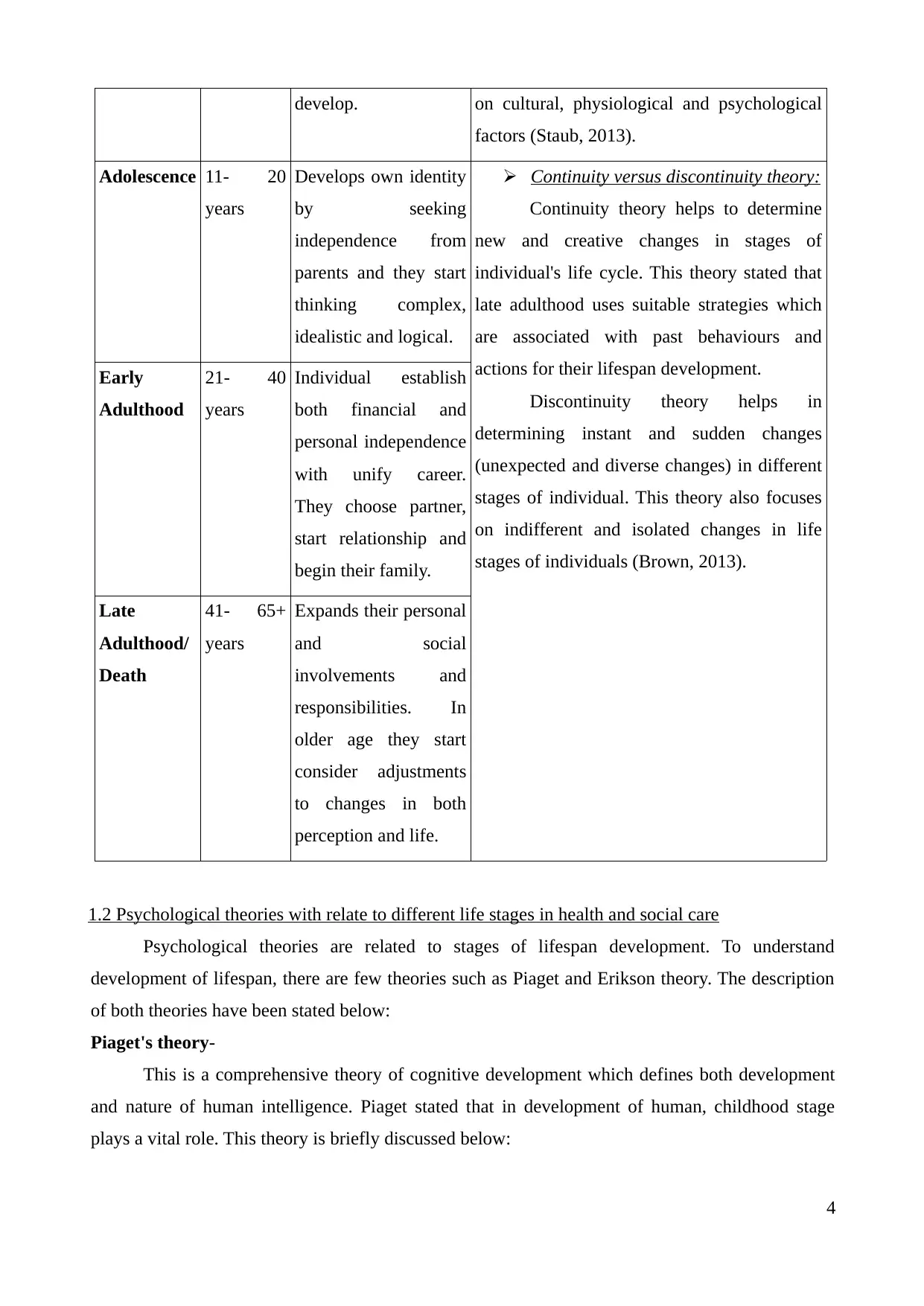
develop. on cultural, physiological and psychological
factors (Staub, 2013).
Adolescence 11- 20
years
Develops own identity
by seeking
independence from
parents and they start
thinking complex,
idealistic and logical.
Continuity versus discontinuity theory:
Continuity theory helps to determine
new and creative changes in stages of
individual's life cycle. This theory stated that
late adulthood uses suitable strategies which
are associated with past behaviours and
actions for their lifespan development.
Discontinuity theory helps in
determining instant and sudden changes
(unexpected and diverse changes) in different
stages of individual. This theory also focuses
on indifferent and isolated changes in life
stages of individuals (Brown, 2013).
Early
Adulthood
21- 40
years
Individual establish
both financial and
personal independence
with unify career.
They choose partner,
start relationship and
begin their family.
Late
Adulthood/
Death
41- 65+
years
Expands their personal
and social
involvements and
responsibilities. In
older age they start
consider adjustments
to changes in both
perception and life.
1.2 Psychological theories with relate to different life stages in health and social care
Psychological theories are related to stages of lifespan development. To understand
development of lifespan, there are few theories such as Piaget and Erikson theory. The description
of both theories have been stated below:
Piaget's theory-
This is a comprehensive theory of cognitive development which defines both development
and nature of human intelligence. Piaget stated that in development of human, childhood stage
plays a vital role. This theory is briefly discussed below:
4
factors (Staub, 2013).
Adolescence 11- 20
years
Develops own identity
by seeking
independence from
parents and they start
thinking complex,
idealistic and logical.
Continuity versus discontinuity theory:
Continuity theory helps to determine
new and creative changes in stages of
individual's life cycle. This theory stated that
late adulthood uses suitable strategies which
are associated with past behaviours and
actions for their lifespan development.
Discontinuity theory helps in
determining instant and sudden changes
(unexpected and diverse changes) in different
stages of individual. This theory also focuses
on indifferent and isolated changes in life
stages of individuals (Brown, 2013).
Early
Adulthood
21- 40
years
Individual establish
both financial and
personal independence
with unify career.
They choose partner,
start relationship and
begin their family.
Late
Adulthood/
Death
41- 65+
years
Expands their personal
and social
involvements and
responsibilities. In
older age they start
consider adjustments
to changes in both
perception and life.
1.2 Psychological theories with relate to different life stages in health and social care
Psychological theories are related to stages of lifespan development. To understand
development of lifespan, there are few theories such as Piaget and Erikson theory. The description
of both theories have been stated below:
Piaget's theory-
This is a comprehensive theory of cognitive development which defines both development
and nature of human intelligence. Piaget stated that in development of human, childhood stage
plays a vital role. This theory is briefly discussed below:
4
Paraphrase This Document
Need a fresh take? Get an instant paraphrase of this document with our AI Paraphraser
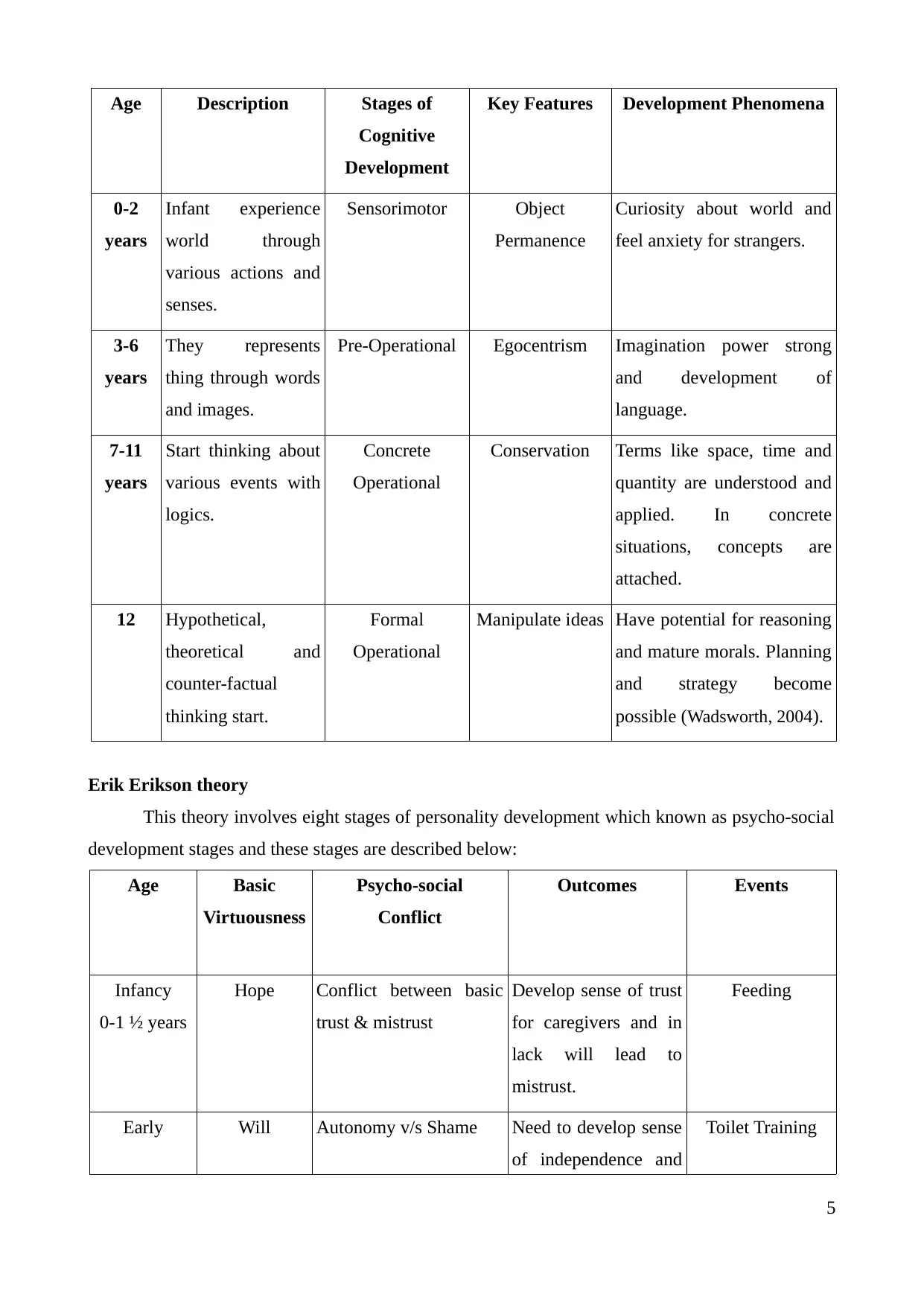
Age Description Stages of
Cognitive
Development
Key Features Development Phenomena
0-2
years
Infant experience
world through
various actions and
senses.
Sensorimotor Object
Permanence
Curiosity about world and
feel anxiety for strangers.
3-6
years
They represents
thing through words
and images.
Pre-Operational Egocentrism Imagination power strong
and development of
language.
7-11
years
Start thinking about
various events with
logics.
Concrete
Operational
Conservation Terms like space, time and
quantity are understood and
applied. In concrete
situations, concepts are
attached.
12 Hypothetical,
theoretical and
counter-factual
thinking start.
Formal
Operational
Manipulate ideas Have potential for reasoning
and mature morals. Planning
and strategy become
possible (Wadsworth, 2004).
Erik Erikson theory
This theory involves eight stages of personality development which known as psycho-social
development stages and these stages are described below:
Age Basic
Virtuousness
Psycho-social
Conflict
Outcomes Events
Infancy
0-1 ½ years
Hope Conflict between basic
trust & mistrust
Develop sense of trust
for caregivers and in
lack will lead to
mistrust.
Feeding
Early Will Autonomy v/s Shame Need to develop sense
of independence and
Toilet Training
5
Cognitive
Development
Key Features Development Phenomena
0-2
years
Infant experience
world through
various actions and
senses.
Sensorimotor Object
Permanence
Curiosity about world and
feel anxiety for strangers.
3-6
years
They represents
thing through words
and images.
Pre-Operational Egocentrism Imagination power strong
and development of
language.
7-11
years
Start thinking about
various events with
logics.
Concrete
Operational
Conservation Terms like space, time and
quantity are understood and
applied. In concrete
situations, concepts are
attached.
12 Hypothetical,
theoretical and
counter-factual
thinking start.
Formal
Operational
Manipulate ideas Have potential for reasoning
and mature morals. Planning
and strategy become
possible (Wadsworth, 2004).
Erik Erikson theory
This theory involves eight stages of personality development which known as psycho-social
development stages and these stages are described below:
Age Basic
Virtuousness
Psycho-social
Conflict
Outcomes Events
Infancy
0-1 ½ years
Hope Conflict between basic
trust & mistrust
Develop sense of trust
for caregivers and in
lack will lead to
mistrust.
Feeding
Early Will Autonomy v/s Shame Need to develop sense
of independence and
Toilet Training
5
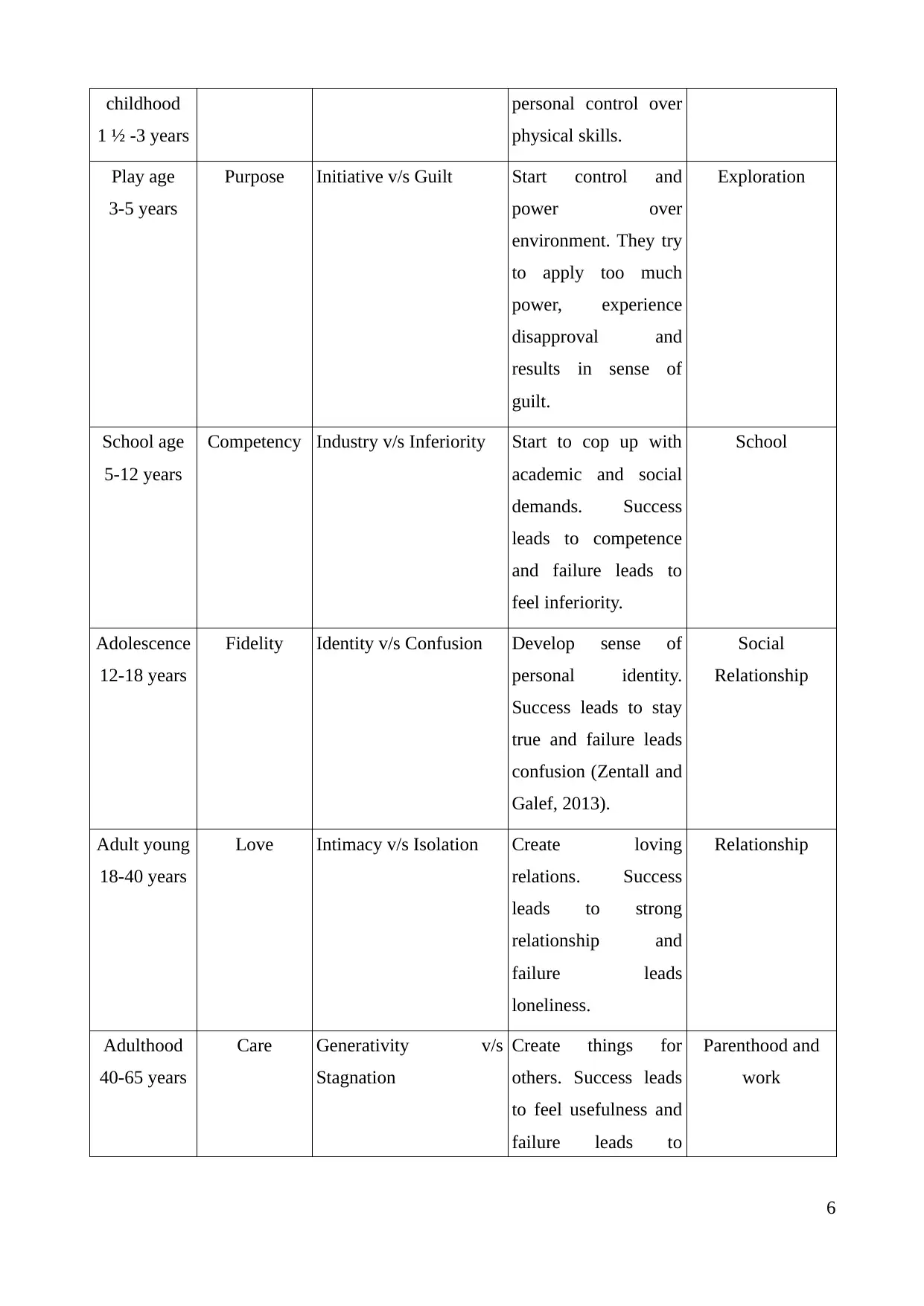
childhood
1 ½ -3 years
personal control over
physical skills.
Play age
3-5 years
Purpose Initiative v/s Guilt Start control and
power over
environment. They try
to apply too much
power, experience
disapproval and
results in sense of
guilt.
Exploration
School age
5-12 years
Competency Industry v/s Inferiority Start to cop up with
academic and social
demands. Success
leads to competence
and failure leads to
feel inferiority.
School
Adolescence
12-18 years
Fidelity Identity v/s Confusion Develop sense of
personal identity.
Success leads to stay
true and failure leads
confusion (Zentall and
Galef, 2013).
Social
Relationship
Adult young
18-40 years
Love Intimacy v/s Isolation Create loving
relations. Success
leads to strong
relationship and
failure leads
loneliness.
Relationship
Adulthood
40-65 years
Care Generativity v/s
Stagnation
Create things for
others. Success leads
to feel usefulness and
failure leads to
Parenthood and
work
6
1 ½ -3 years
personal control over
physical skills.
Play age
3-5 years
Purpose Initiative v/s Guilt Start control and
power over
environment. They try
to apply too much
power, experience
disapproval and
results in sense of
guilt.
Exploration
School age
5-12 years
Competency Industry v/s Inferiority Start to cop up with
academic and social
demands. Success
leads to competence
and failure leads to
feel inferiority.
School
Adolescence
12-18 years
Fidelity Identity v/s Confusion Develop sense of
personal identity.
Success leads to stay
true and failure leads
confusion (Zentall and
Galef, 2013).
Social
Relationship
Adult young
18-40 years
Love Intimacy v/s Isolation Create loving
relations. Success
leads to strong
relationship and
failure leads
loneliness.
Relationship
Adulthood
40-65 years
Care Generativity v/s
Stagnation
Create things for
others. Success leads
to feel usefulness and
failure leads to
Parenthood and
work
6
⊘ This is a preview!⊘
Do you want full access?
Subscribe today to unlock all pages.

Trusted by 1+ million students worldwide
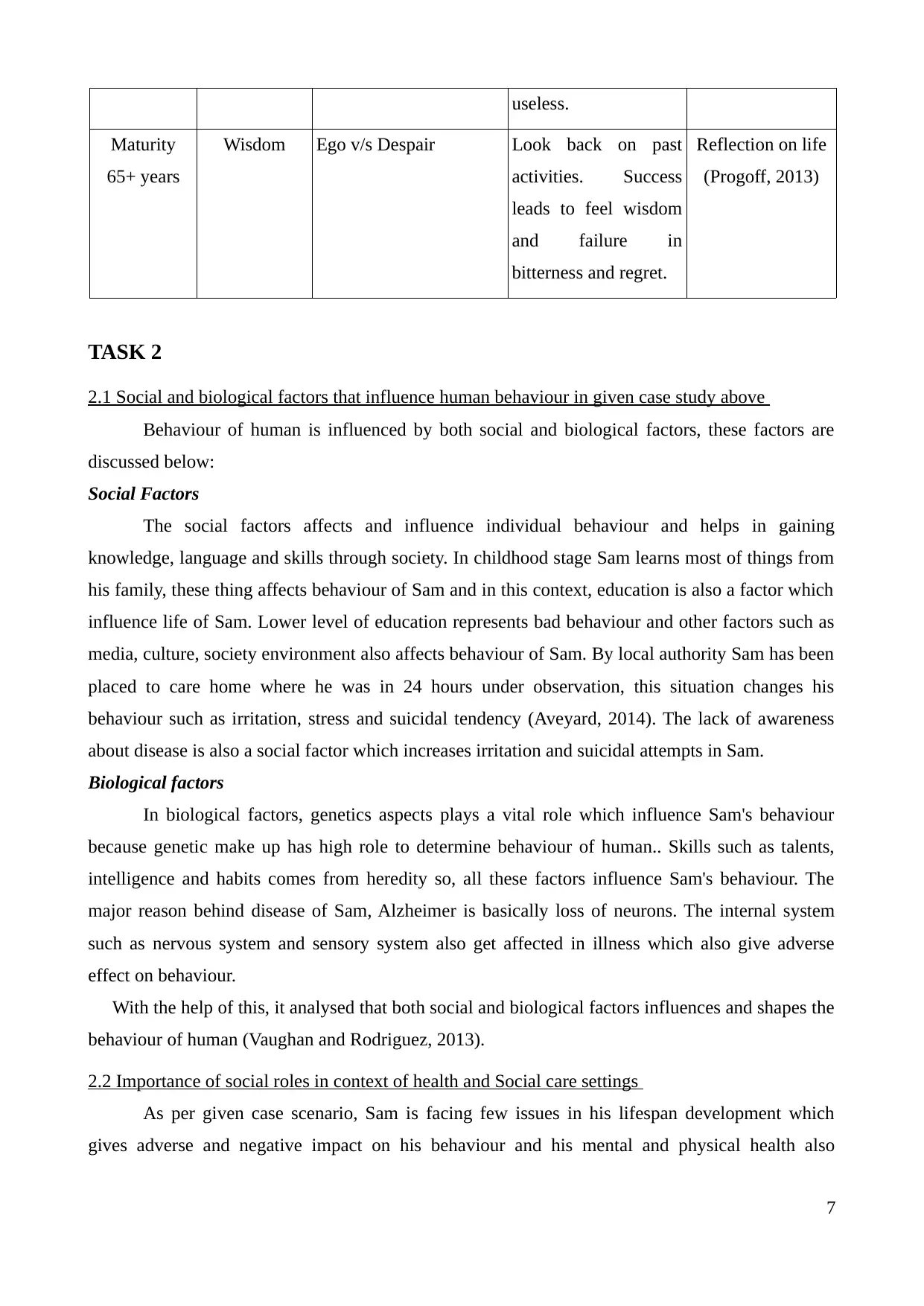
useless.
Maturity
65+ years
Wisdom Ego v/s Despair Look back on past
activities. Success
leads to feel wisdom
and failure in
bitterness and regret.
Reflection on life
(Progoff, 2013)
TASK 2
2.1 Social and biological factors that influence human behaviour in given case study above
Behaviour of human is influenced by both social and biological factors, these factors are
discussed below:
Social Factors
The social factors affects and influence individual behaviour and helps in gaining
knowledge, language and skills through society. In childhood stage Sam learns most of things from
his family, these thing affects behaviour of Sam and in this context, education is also a factor which
influence life of Sam. Lower level of education represents bad behaviour and other factors such as
media, culture, society environment also affects behaviour of Sam. By local authority Sam has been
placed to care home where he was in 24 hours under observation, this situation changes his
behaviour such as irritation, stress and suicidal tendency (Aveyard, 2014). The lack of awareness
about disease is also a social factor which increases irritation and suicidal attempts in Sam.
Biological factors
In biological factors, genetics aspects plays a vital role which influence Sam's behaviour
because genetic make up has high role to determine behaviour of human.. Skills such as talents,
intelligence and habits comes from heredity so, all these factors influence Sam's behaviour. The
major reason behind disease of Sam, Alzheimer is basically loss of neurons. The internal system
such as nervous system and sensory system also get affected in illness which also give adverse
effect on behaviour.
With the help of this, it analysed that both social and biological factors influences and shapes the
behaviour of human (Vaughan and Rodriguez, 2013).
2.2 Importance of social roles in context of health and Social care settings
As per given case scenario, Sam is facing few issues in his lifespan development which
gives adverse and negative impact on his behaviour and his mental and physical health also
7
Maturity
65+ years
Wisdom Ego v/s Despair Look back on past
activities. Success
leads to feel wisdom
and failure in
bitterness and regret.
Reflection on life
(Progoff, 2013)
TASK 2
2.1 Social and biological factors that influence human behaviour in given case study above
Behaviour of human is influenced by both social and biological factors, these factors are
discussed below:
Social Factors
The social factors affects and influence individual behaviour and helps in gaining
knowledge, language and skills through society. In childhood stage Sam learns most of things from
his family, these thing affects behaviour of Sam and in this context, education is also a factor which
influence life of Sam. Lower level of education represents bad behaviour and other factors such as
media, culture, society environment also affects behaviour of Sam. By local authority Sam has been
placed to care home where he was in 24 hours under observation, this situation changes his
behaviour such as irritation, stress and suicidal tendency (Aveyard, 2014). The lack of awareness
about disease is also a social factor which increases irritation and suicidal attempts in Sam.
Biological factors
In biological factors, genetics aspects plays a vital role which influence Sam's behaviour
because genetic make up has high role to determine behaviour of human.. Skills such as talents,
intelligence and habits comes from heredity so, all these factors influence Sam's behaviour. The
major reason behind disease of Sam, Alzheimer is basically loss of neurons. The internal system
such as nervous system and sensory system also get affected in illness which also give adverse
effect on behaviour.
With the help of this, it analysed that both social and biological factors influences and shapes the
behaviour of human (Vaughan and Rodriguez, 2013).
2.2 Importance of social roles in context of health and Social care settings
As per given case scenario, Sam is facing few issues in his lifespan development which
gives adverse and negative impact on his behaviour and his mental and physical health also
7
Paraphrase This Document
Need a fresh take? Get an instant paraphrase of this document with our AI Paraphraser
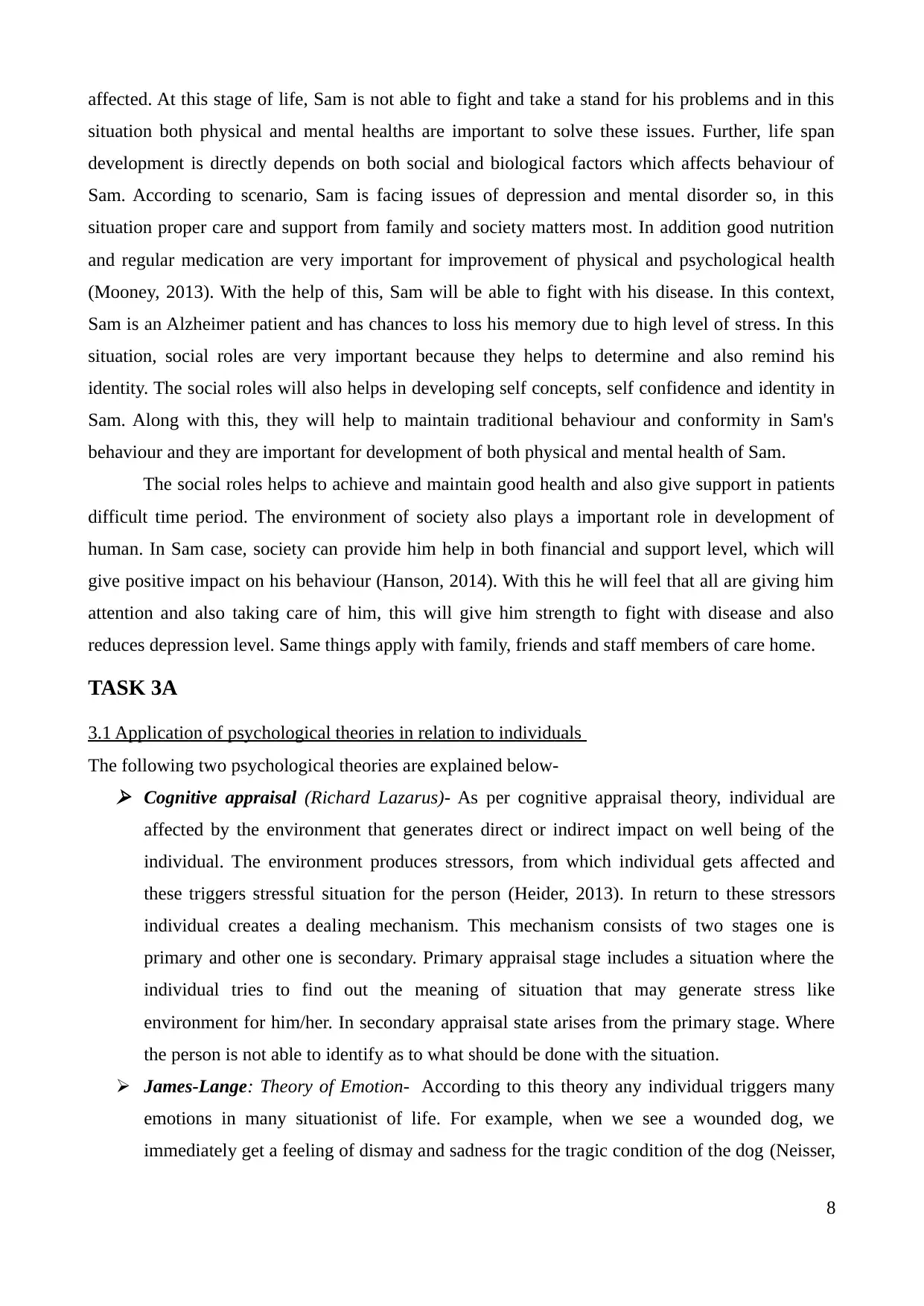
affected. At this stage of life, Sam is not able to fight and take a stand for his problems and in this
situation both physical and mental healths are important to solve these issues. Further, life span
development is directly depends on both social and biological factors which affects behaviour of
Sam. According to scenario, Sam is facing issues of depression and mental disorder so, in this
situation proper care and support from family and society matters most. In addition good nutrition
and regular medication are very important for improvement of physical and psychological health
(Mooney, 2013). With the help of this, Sam will be able to fight with his disease. In this context,
Sam is an Alzheimer patient and has chances to loss his memory due to high level of stress. In this
situation, social roles are very important because they helps to determine and also remind his
identity. The social roles will also helps in developing self concepts, self confidence and identity in
Sam. Along with this, they will help to maintain traditional behaviour and conformity in Sam's
behaviour and they are important for development of both physical and mental health of Sam.
The social roles helps to achieve and maintain good health and also give support in patients
difficult time period. The environment of society also plays a important role in development of
human. In Sam case, society can provide him help in both financial and support level, which will
give positive impact on his behaviour (Hanson, 2014). With this he will feel that all are giving him
attention and also taking care of him, this will give him strength to fight with disease and also
reduces depression level. Same things apply with family, friends and staff members of care home.
TASK 3A
3.1 Application of psychological theories in relation to individuals
The following two psychological theories are explained below- Cognitive appraisal (Richard Lazarus)- As per cognitive appraisal theory, individual are
affected by the environment that generates direct or indirect impact on well being of the
individual. The environment produces stressors, from which individual gets affected and
these triggers stressful situation for the person (Heider, 2013). In return to these stressors
individual creates a dealing mechanism. This mechanism consists of two stages one is
primary and other one is secondary. Primary appraisal stage includes a situation where the
individual tries to find out the meaning of situation that may generate stress like
environment for him/her. In secondary appraisal state arises from the primary stage. Where
the person is not able to identify as to what should be done with the situation.
James-Lange: Theory of Emotion- According to this theory any individual triggers many
emotions in many situationist of life. For example, when we see a wounded dog, we
immediately get a feeling of dismay and sadness for the tragic condition of the dog (Neisser,
8
situation both physical and mental healths are important to solve these issues. Further, life span
development is directly depends on both social and biological factors which affects behaviour of
Sam. According to scenario, Sam is facing issues of depression and mental disorder so, in this
situation proper care and support from family and society matters most. In addition good nutrition
and regular medication are very important for improvement of physical and psychological health
(Mooney, 2013). With the help of this, Sam will be able to fight with his disease. In this context,
Sam is an Alzheimer patient and has chances to loss his memory due to high level of stress. In this
situation, social roles are very important because they helps to determine and also remind his
identity. The social roles will also helps in developing self concepts, self confidence and identity in
Sam. Along with this, they will help to maintain traditional behaviour and conformity in Sam's
behaviour and they are important for development of both physical and mental health of Sam.
The social roles helps to achieve and maintain good health and also give support in patients
difficult time period. The environment of society also plays a important role in development of
human. In Sam case, society can provide him help in both financial and support level, which will
give positive impact on his behaviour (Hanson, 2014). With this he will feel that all are giving him
attention and also taking care of him, this will give him strength to fight with disease and also
reduces depression level. Same things apply with family, friends and staff members of care home.
TASK 3A
3.1 Application of psychological theories in relation to individuals
The following two psychological theories are explained below- Cognitive appraisal (Richard Lazarus)- As per cognitive appraisal theory, individual are
affected by the environment that generates direct or indirect impact on well being of the
individual. The environment produces stressors, from which individual gets affected and
these triggers stressful situation for the person (Heider, 2013). In return to these stressors
individual creates a dealing mechanism. This mechanism consists of two stages one is
primary and other one is secondary. Primary appraisal stage includes a situation where the
individual tries to find out the meaning of situation that may generate stress like
environment for him/her. In secondary appraisal state arises from the primary stage. Where
the person is not able to identify as to what should be done with the situation.
James-Lange: Theory of Emotion- According to this theory any individual triggers many
emotions in many situationist of life. For example, when we see a wounded dog, we
immediately get a feeling of dismay and sadness for the tragic condition of the dog (Neisser,
8
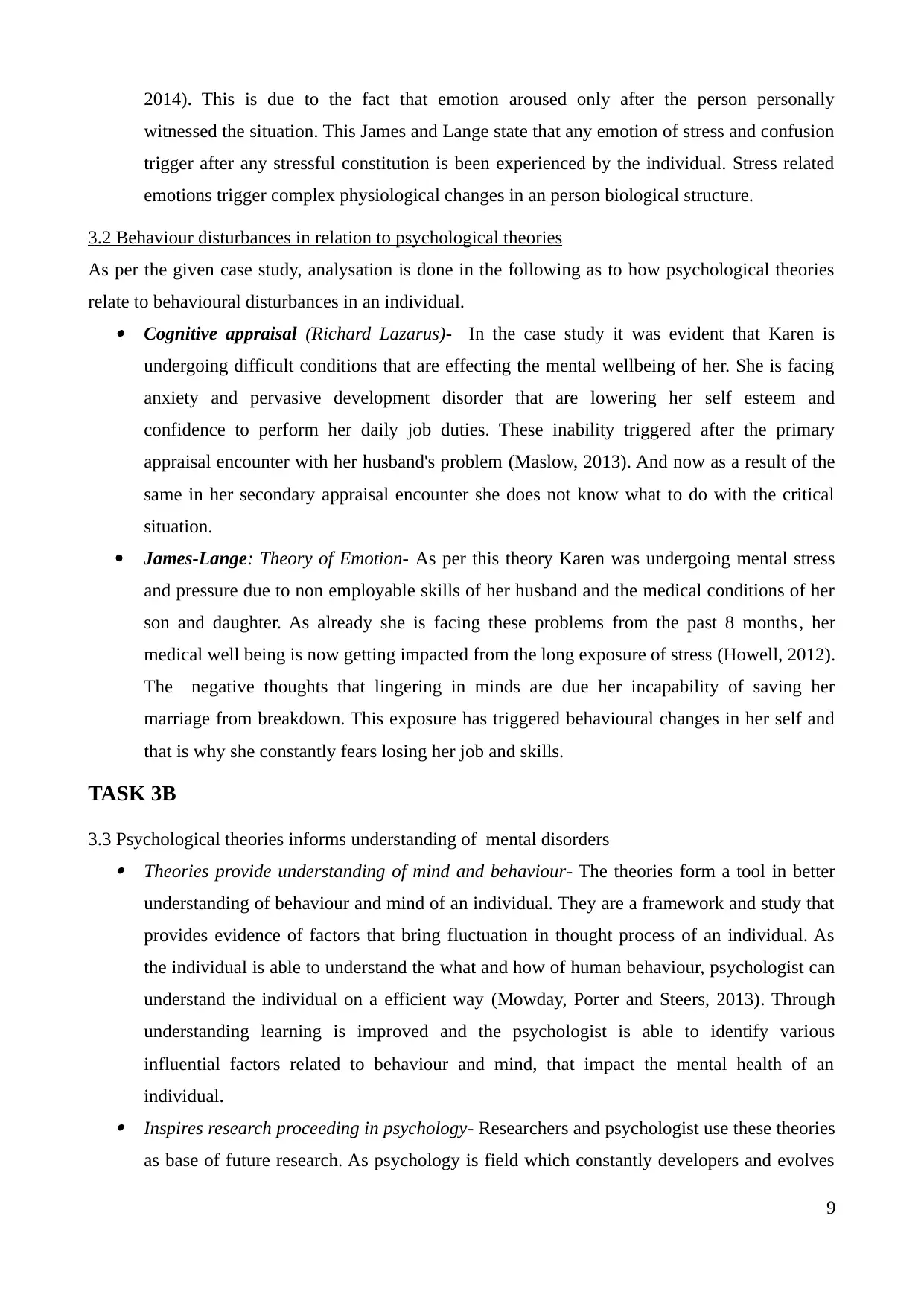
2014). This is due to the fact that emotion aroused only after the person personally
witnessed the situation. This James and Lange state that any emotion of stress and confusion
trigger after any stressful constitution is been experienced by the individual. Stress related
emotions trigger complex physiological changes in an person biological structure.
3.2 Behaviour disturbances in relation to psychological theories
As per the given case study, analysation is done in the following as to how psychological theories
relate to behavioural disturbances in an individual. Cognitive appraisal (Richard Lazarus)- In the case study it was evident that Karen is
undergoing difficult conditions that are effecting the mental wellbeing of her. She is facing
anxiety and pervasive development disorder that are lowering her self esteem and
confidence to perform her daily job duties. These inability triggered after the primary
appraisal encounter with her husband's problem (Maslow, 2013). And now as a result of the
same in her secondary appraisal encounter she does not know what to do with the critical
situation.
James-Lange: Theory of Emotion- As per this theory Karen was undergoing mental stress
and pressure due to non employable skills of her husband and the medical conditions of her
son and daughter. As already she is facing these problems from the past 8 months, her
medical well being is now getting impacted from the long exposure of stress (Howell, 2012).
The negative thoughts that lingering in minds are due her incapability of saving her
marriage from breakdown. This exposure has triggered behavioural changes in her self and
that is why she constantly fears losing her job and skills.
TASK 3B
3.3 Psychological theories informs understanding of mental disorders Theories provide understanding of mind and behaviour- The theories form a tool in better
understanding of behaviour and mind of an individual. They are a framework and study that
provides evidence of factors that bring fluctuation in thought process of an individual. As
the individual is able to understand the what and how of human behaviour, psychologist can
understand the individual on a efficient way (Mowday, Porter and Steers, 2013). Through
understanding learning is improved and the psychologist is able to identify various
influential factors related to behaviour and mind, that impact the mental health of an
individual. Inspires research proceeding in psychology- Researchers and psychologist use these theories
as base of future research. As psychology is field which constantly developers and evolves
9
witnessed the situation. This James and Lange state that any emotion of stress and confusion
trigger after any stressful constitution is been experienced by the individual. Stress related
emotions trigger complex physiological changes in an person biological structure.
3.2 Behaviour disturbances in relation to psychological theories
As per the given case study, analysation is done in the following as to how psychological theories
relate to behavioural disturbances in an individual. Cognitive appraisal (Richard Lazarus)- In the case study it was evident that Karen is
undergoing difficult conditions that are effecting the mental wellbeing of her. She is facing
anxiety and pervasive development disorder that are lowering her self esteem and
confidence to perform her daily job duties. These inability triggered after the primary
appraisal encounter with her husband's problem (Maslow, 2013). And now as a result of the
same in her secondary appraisal encounter she does not know what to do with the critical
situation.
James-Lange: Theory of Emotion- As per this theory Karen was undergoing mental stress
and pressure due to non employable skills of her husband and the medical conditions of her
son and daughter. As already she is facing these problems from the past 8 months, her
medical well being is now getting impacted from the long exposure of stress (Howell, 2012).
The negative thoughts that lingering in minds are due her incapability of saving her
marriage from breakdown. This exposure has triggered behavioural changes in her self and
that is why she constantly fears losing her job and skills.
TASK 3B
3.3 Psychological theories informs understanding of mental disorders Theories provide understanding of mind and behaviour- The theories form a tool in better
understanding of behaviour and mind of an individual. They are a framework and study that
provides evidence of factors that bring fluctuation in thought process of an individual. As
the individual is able to understand the what and how of human behaviour, psychologist can
understand the individual on a efficient way (Mowday, Porter and Steers, 2013). Through
understanding learning is improved and the psychologist is able to identify various
influential factors related to behaviour and mind, that impact the mental health of an
individual. Inspires research proceeding in psychology- Researchers and psychologist use these theories
as base of future research. As psychology is field which constantly developers and evolves
9
⊘ This is a preview!⊘
Do you want full access?
Subscribe today to unlock all pages.

Trusted by 1+ million students worldwide
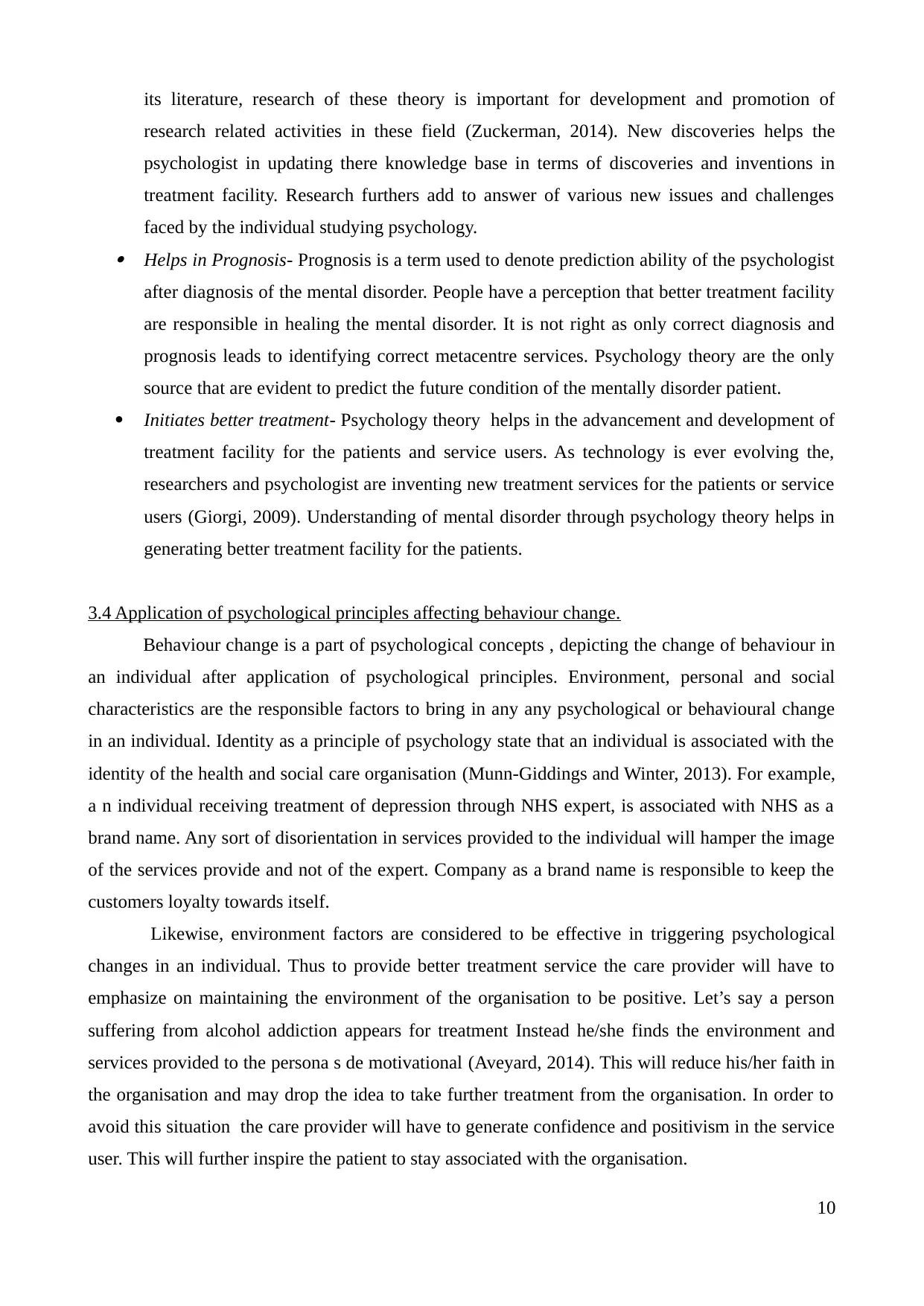
its literature, research of these theory is important for development and promotion of
research related activities in these field (Zuckerman, 2014). New discoveries helps the
psychologist in updating there knowledge base in terms of discoveries and inventions in
treatment facility. Research furthers add to answer of various new issues and challenges
faced by the individual studying psychology. Helps in Prognosis- Prognosis is a term used to denote prediction ability of the psychologist
after diagnosis of the mental disorder. People have a perception that better treatment facility
are responsible in healing the mental disorder. It is not right as only correct diagnosis and
prognosis leads to identifying correct metacentre services. Psychology theory are the only
source that are evident to predict the future condition of the mentally disorder patient.
Initiates better treatment- Psychology theory helps in the advancement and development of
treatment facility for the patients and service users. As technology is ever evolving the,
researchers and psychologist are inventing new treatment services for the patients or service
users (Giorgi, 2009). Understanding of mental disorder through psychology theory helps in
generating better treatment facility for the patients.
3.4 Application of psychological principles affecting behaviour change.
Behaviour change is a part of psychological concepts , depicting the change of behaviour in
an individual after application of psychological principles. Environment, personal and social
characteristics are the responsible factors to bring in any any psychological or behavioural change
in an individual. Identity as a principle of psychology state that an individual is associated with the
identity of the health and social care organisation (Munn-Giddings and Winter, 2013). For example,
a n individual receiving treatment of depression through NHS expert, is associated with NHS as a
brand name. Any sort of disorientation in services provided to the individual will hamper the image
of the services provide and not of the expert. Company as a brand name is responsible to keep the
customers loyalty towards itself.
Likewise, environment factors are considered to be effective in triggering psychological
changes in an individual. Thus to provide better treatment service the care provider will have to
emphasize on maintaining the environment of the organisation to be positive. Let’s say a person
suffering from alcohol addiction appears for treatment Instead he/she finds the environment and
services provided to the persona s de motivational (Aveyard, 2014). This will reduce his/her faith in
the organisation and may drop the idea to take further treatment from the organisation. In order to
avoid this situation the care provider will have to generate confidence and positivism in the service
user. This will further inspire the patient to stay associated with the organisation.
10
research related activities in these field (Zuckerman, 2014). New discoveries helps the
psychologist in updating there knowledge base in terms of discoveries and inventions in
treatment facility. Research furthers add to answer of various new issues and challenges
faced by the individual studying psychology. Helps in Prognosis- Prognosis is a term used to denote prediction ability of the psychologist
after diagnosis of the mental disorder. People have a perception that better treatment facility
are responsible in healing the mental disorder. It is not right as only correct diagnosis and
prognosis leads to identifying correct metacentre services. Psychology theory are the only
source that are evident to predict the future condition of the mentally disorder patient.
Initiates better treatment- Psychology theory helps in the advancement and development of
treatment facility for the patients and service users. As technology is ever evolving the,
researchers and psychologist are inventing new treatment services for the patients or service
users (Giorgi, 2009). Understanding of mental disorder through psychology theory helps in
generating better treatment facility for the patients.
3.4 Application of psychological principles affecting behaviour change.
Behaviour change is a part of psychological concepts , depicting the change of behaviour in
an individual after application of psychological principles. Environment, personal and social
characteristics are the responsible factors to bring in any any psychological or behavioural change
in an individual. Identity as a principle of psychology state that an individual is associated with the
identity of the health and social care organisation (Munn-Giddings and Winter, 2013). For example,
a n individual receiving treatment of depression through NHS expert, is associated with NHS as a
brand name. Any sort of disorientation in services provided to the individual will hamper the image
of the services provide and not of the expert. Company as a brand name is responsible to keep the
customers loyalty towards itself.
Likewise, environment factors are considered to be effective in triggering psychological
changes in an individual. Thus to provide better treatment service the care provider will have to
emphasize on maintaining the environment of the organisation to be positive. Let’s say a person
suffering from alcohol addiction appears for treatment Instead he/she finds the environment and
services provided to the persona s de motivational (Aveyard, 2014). This will reduce his/her faith in
the organisation and may drop the idea to take further treatment from the organisation. In order to
avoid this situation the care provider will have to generate confidence and positivism in the service
user. This will further inspire the patient to stay associated with the organisation.
10
Paraphrase This Document
Need a fresh take? Get an instant paraphrase of this document with our AI Paraphraser
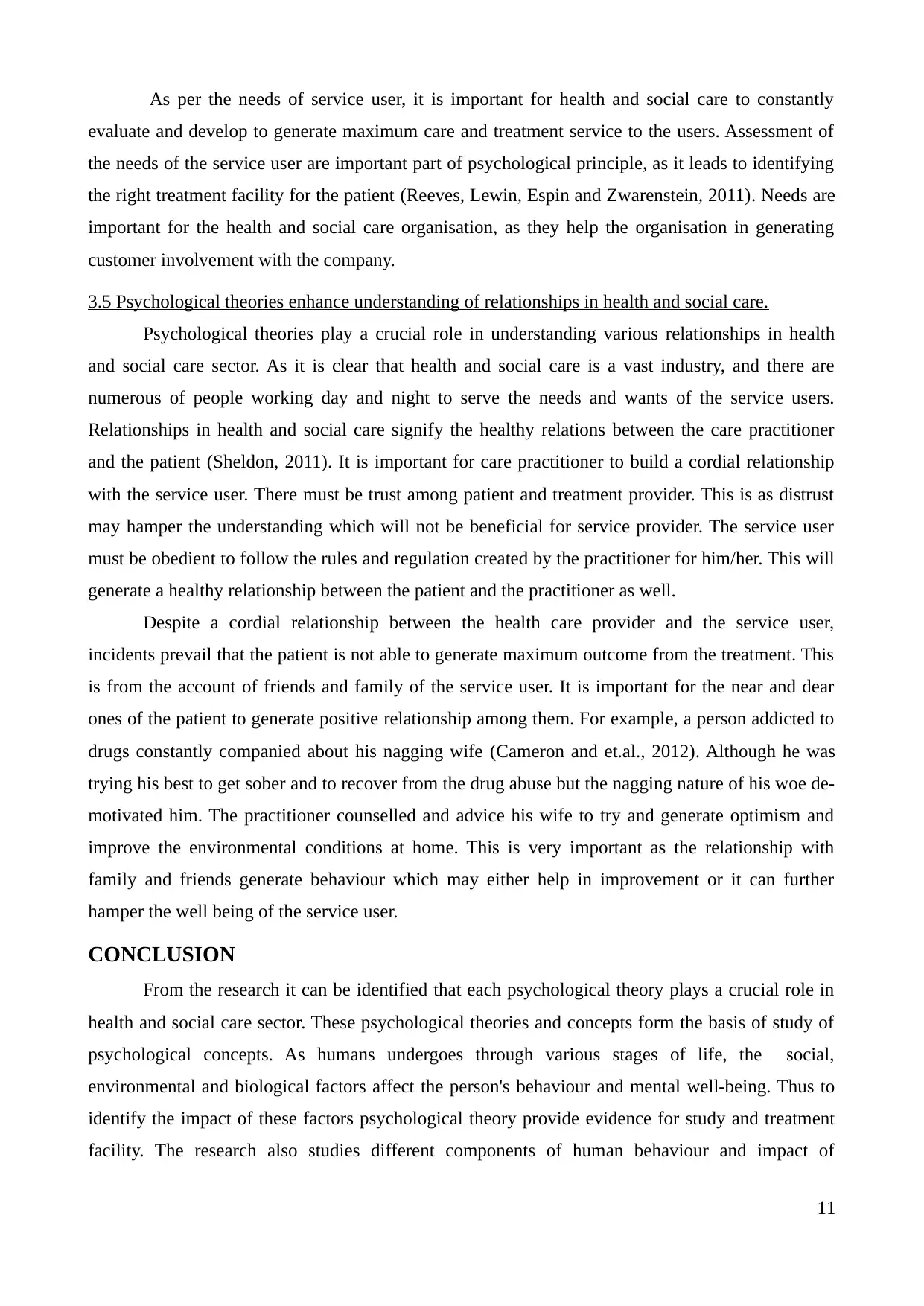
As per the needs of service user, it is important for health and social care to constantly
evaluate and develop to generate maximum care and treatment service to the users. Assessment of
the needs of the service user are important part of psychological principle, as it leads to identifying
the right treatment facility for the patient (Reeves, Lewin, Espin and Zwarenstein, 2011). Needs are
important for the health and social care organisation, as they help the organisation in generating
customer involvement with the company.
3.5 Psychological theories enhance understanding of relationships in health and social care.
Psychological theories play a crucial role in understanding various relationships in health
and social care sector. As it is clear that health and social care is a vast industry, and there are
numerous of people working day and night to serve the needs and wants of the service users.
Relationships in health and social care signify the healthy relations between the care practitioner
and the patient (Sheldon, 2011). It is important for care practitioner to build a cordial relationship
with the service user. There must be trust among patient and treatment provider. This is as distrust
may hamper the understanding which will not be beneficial for service provider. The service user
must be obedient to follow the rules and regulation created by the practitioner for him/her. This will
generate a healthy relationship between the patient and the practitioner as well.
Despite a cordial relationship between the health care provider and the service user,
incidents prevail that the patient is not able to generate maximum outcome from the treatment. This
is from the account of friends and family of the service user. It is important for the near and dear
ones of the patient to generate positive relationship among them. For example, a person addicted to
drugs constantly companied about his nagging wife (Cameron and et.al., 2012). Although he was
trying his best to get sober and to recover from the drug abuse but the nagging nature of his woe de-
motivated him. The practitioner counselled and advice his wife to try and generate optimism and
improve the environmental conditions at home. This is very important as the relationship with
family and friends generate behaviour which may either help in improvement or it can further
hamper the well being of the service user.
CONCLUSION
From the research it can be identified that each psychological theory plays a crucial role in
health and social care sector. These psychological theories and concepts form the basis of study of
psychological concepts. As humans undergoes through various stages of life, the social,
environmental and biological factors affect the person's behaviour and mental well-being. Thus to
identify the impact of these factors psychological theory provide evidence for study and treatment
facility. The research also studies different components of human behaviour and impact of
11
evaluate and develop to generate maximum care and treatment service to the users. Assessment of
the needs of the service user are important part of psychological principle, as it leads to identifying
the right treatment facility for the patient (Reeves, Lewin, Espin and Zwarenstein, 2011). Needs are
important for the health and social care organisation, as they help the organisation in generating
customer involvement with the company.
3.5 Psychological theories enhance understanding of relationships in health and social care.
Psychological theories play a crucial role in understanding various relationships in health
and social care sector. As it is clear that health and social care is a vast industry, and there are
numerous of people working day and night to serve the needs and wants of the service users.
Relationships in health and social care signify the healthy relations between the care practitioner
and the patient (Sheldon, 2011). It is important for care practitioner to build a cordial relationship
with the service user. There must be trust among patient and treatment provider. This is as distrust
may hamper the understanding which will not be beneficial for service provider. The service user
must be obedient to follow the rules and regulation created by the practitioner for him/her. This will
generate a healthy relationship between the patient and the practitioner as well.
Despite a cordial relationship between the health care provider and the service user,
incidents prevail that the patient is not able to generate maximum outcome from the treatment. This
is from the account of friends and family of the service user. It is important for the near and dear
ones of the patient to generate positive relationship among them. For example, a person addicted to
drugs constantly companied about his nagging wife (Cameron and et.al., 2012). Although he was
trying his best to get sober and to recover from the drug abuse but the nagging nature of his woe de-
motivated him. The practitioner counselled and advice his wife to try and generate optimism and
improve the environmental conditions at home. This is very important as the relationship with
family and friends generate behaviour which may either help in improvement or it can further
hamper the well being of the service user.
CONCLUSION
From the research it can be identified that each psychological theory plays a crucial role in
health and social care sector. These psychological theories and concepts form the basis of study of
psychological concepts. As humans undergoes through various stages of life, the social,
environmental and biological factors affect the person's behaviour and mental well-being. Thus to
identify the impact of these factors psychological theory provide evidence for study and treatment
facility. The research also studies different components of human behaviour and impact of
11
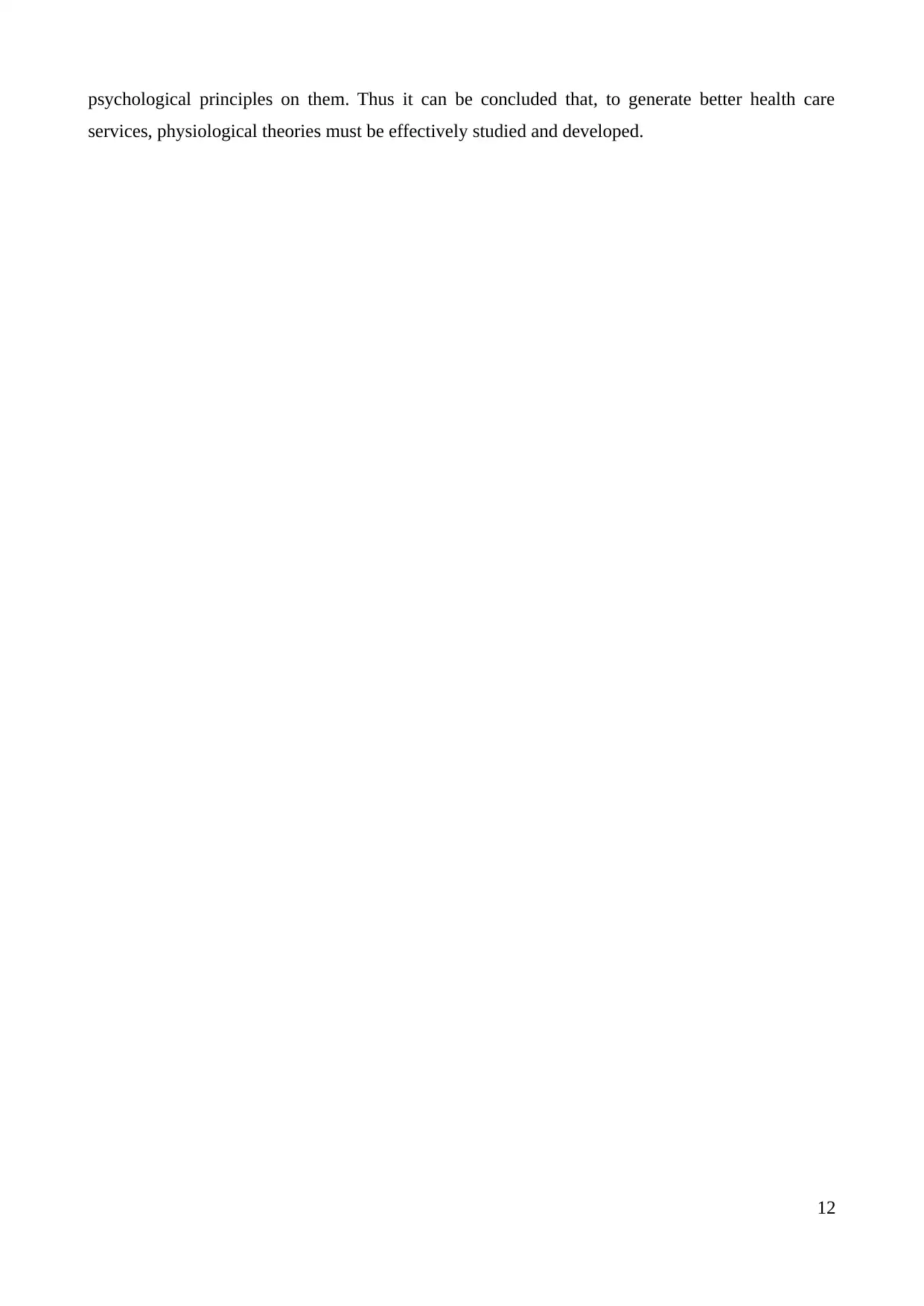
psychological principles on them. Thus it can be concluded that, to generate better health care
services, physiological theories must be effectively studied and developed.
12
services, physiological theories must be effectively studied and developed.
12
⊘ This is a preview!⊘
Do you want full access?
Subscribe today to unlock all pages.

Trusted by 1+ million students worldwide
1 out of 13
Related Documents
Your All-in-One AI-Powered Toolkit for Academic Success.
+13062052269
info@desklib.com
Available 24*7 on WhatsApp / Email
![[object Object]](/_next/static/media/star-bottom.7253800d.svg)
Unlock your academic potential
Copyright © 2020–2026 A2Z Services. All Rights Reserved. Developed and managed by ZUCOL.





